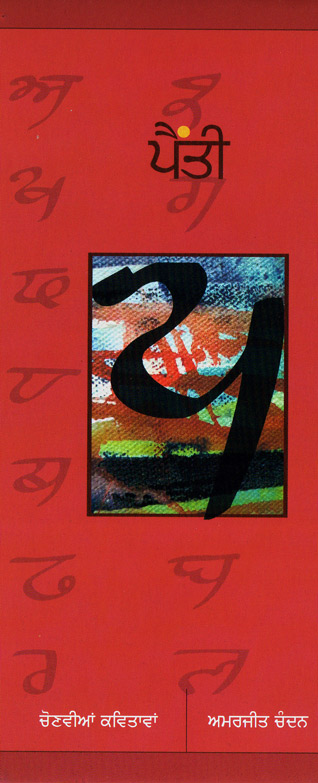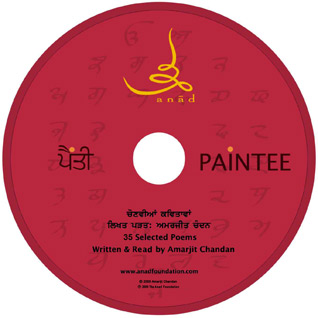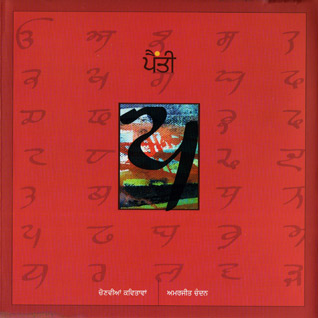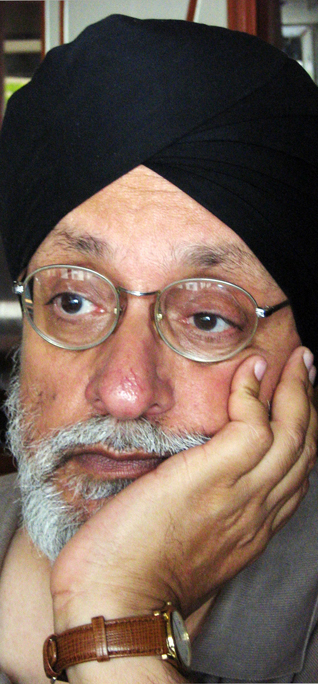Books
35 - Paintee
A Book Review by T. SHER SINGH
DAILY FIX
July 2, 2012
PAINTEE- CHONVIAAN KAVITAVAAN [SELECTED POEMS], by Amarjit Chandan. The Anad Foundation, New Delhi, 2009. Punjabi, Hardcover, pp 96, Rs 1500. Open Library ID # OL25303347M
"Paintee" is sikhchic.com's Book of The Month selection for July, 2012.
I have never been one for getting my kicks out of watching others having fun.
I am not into spectator sports. If I want to have fun, I pick up my squash racket and …
I am not into porn. If I want to have fun, I … oh well, you get my gist.
The same goes when it comes to books.
I am not willing to relegate all the fun of book ownership, and all the delights that come with it, to some unknown publisher so that I can get to read it on a cold screen, sanitized of all sensory pleasure, leaving behind a mere image which dissolves into thin air at the touch of a button.
Call me anachronistic if you wish, but I’m not ready for an eReader.
Call me old-fashioned if you will, but I want the feel of a book between my fingers, resting on the palms of my hands. The weight of it on my lap. The smell of print and fibre. The rustle of the page as I turn one over. The terrain of the parchment, mapped by the friction ridges of my finger-tip. The savour of the texture of the paperscape.
If I like the book, I want to own it. I want it on my book-shelf, to be fondled from time to time, and pulled off and ravished again one day.
Surround yourself with these true friends, a poet once said about books.
You can’t do it with electronic tablets.
Hence my biggest vice - addiction, dirty habit - remains my pathological acquisition of books.
Marry a good author and his creation to the beauty of paper, the art of printing, the genius of design, the craft of binding … and you’ll have me eating out of your hand merely to get the fix of owning the book.
'maya moh' - slavery to worldiness - they call it, and I am afflicted.
So, imagine my prurient pleasure when I got my dirty little fingers on my latest acquisition.
Paintee - “35” - is a collection of poems in Punjabi/Gurmukhi by poet Amarjit Singh Chandan who currently calls the British Isles home.
This exquisite publication gives me oodles of joy every time I leaf through it, for a myriad of reasons.
Where should I begin?
It is not every day that you come across a book of Punjabi poetry which delights you at the very first touch.
The publishing industry in India has been entrenched in its belief - and continues to this day - that beauty of form should never be allowed to interfere with substance in any of its publications.
True to their credo, Indian publishers find the cheapest paper to publish poetry, for example. They seek out the most basic of draughtsmen to cut and paste together a cover, with neither colour nor proportion nor relevance of any consequence. A myopic type-setter who thinks that getting the letters of the text in proper sequence 95% of the time is a triumph in itself. A printer who agrees that aligning the pages in symmetry is a wonderful goal, but not humanly possible.
These same publishers also believe that proof-readers are to be avoided like the plague. And they themselves are of too modest a temperament to venture into anything as crass as marketing a book or letting the world know that it exists.
Hence most of the books of poetry I have from the subcontinent are, to say the least, not a delight to own.
Amarjit Chandan’s Paintee is a marked departure.
Probably because it’s been published by The Anad Foundation, under the personal stewardship of Baldeep Singh. I know that everything he touches is blessed with class and style.
Paintee is a delight to hold and behold.
Without being an expensive or extravagant production - all of its illustrations, for example, are in black and white - it exudes luxury and lavishness.
The images are a combination of the abstract and the lines and forms of the paintee - the popular, collective term for the 35 letters of the Punjabi/Gurmukhi alphabet - each balancing with and juxtaposing a page of poetic text.
The illustrations and design are by Gurvinder Singh -- no other than the award-winning filmmaker of "Anneh Ghorreh da Daan" fame!
The font and book format are pleasant to the eye. The glossy, full-colour dust jacket grabs your attention and demands that you pick it off the shelf. The book-binding is commiserate with the weight of the thick handmade paper.
All of these elements conspire to lure you into dipping into the thirty-five poems that adorn the book.
It is at this point that I stop for a moment and offer a silent prayer of gratitude to my parents who insisted, despite all of my resistance, that I learn Punjabi.
Knowing a language other than the one you have to use for daily survival, is like having a key to a parallel universe … a different set of planets, another sun, another moon, another Milky Way!
Amarjit’s poems are songs.
Understandably. They are inspired by Guru Nanak’s own poetry.
Aarti - a ritual of adoration captured famously by Guru Nanak in Kirtan Sohela - for example, recurs over and over again in Paintee, by picking up Nanak’s metaphor and running with it. Remarkably, every time I read Amarjit’s renditions, I feel the urge to recite Nanak’s own verse … and do, only to understand it a little better this time around.
I like what Amarjit does with the popular imagery from gurbani. He makes it more accessible by giving it modern-day parlance.
I also find his lyricism intoxicating. It has Vir Singh’s flight and, at the same time, Mohan Singh’s earthiness.
I enjoy Amarjit’s love of language - not just the word-play but also his revelling in both the form and the substance of language. He picks up, for example, different junctures from the development of Gurmukhi and celebrates its progress through the centuries.
I am mesmerized by his evocation of the luminaries who have paved the way, not as untouchable heroes but as equals, as ones just like you and me who did their best, and more, to build a Begumpura (camelot).
I wish all of you who read my review have - or will acquire - the ability to taste first hand the buffet that Amarjit has put together for us.
For those who are handicapped by not knowing the language, I hope some good soul somewhere will soon translate these gems and make them more widely accessible, even though invariably much of the beauty will be lost in translation.
The great scholar of Sikhi, Hew McLeod, had the opportunity to help Amarjit translate one of his poems, albeit the exercise remains incomplete. Here’s his version, but first, Amarjit’s introduction to the poem, Likhansar:
In Talvandī Sābo (Damdamā Sāhib) under Guru Gobind Singh’s supervision, his scholars and calligraphers Bhai Mani Singh and Baba Dip Singh compiled the Dasam Granth, and made four copies of the Gurū Granth Sāhib. Legend has it that the Guru immersed Bhai Mani Singh’s reed-pen and ink in the pond saying that from this place rivers of knowledge will flow and from the school of learning many scholars and poets will emerge. Now there is a gurdwara named Likhansar (The Lagoon of the Writ) at the spot where pilgrims bow before the Punjabi alphabet (Painti Gurmukhi). There used to be a sand pit in the gurdwara on which mothers made their young children trace the first letter of the script by holding their hand. Now there is marble all over.
This is the Kashi of the Guru, the school of learning.
It always waits on its toes for the wise.
Pilgrims bow their heads to the Painti Gurmukhi alphabet.
The light wells up from each letter with rare meanings.
Miracles happen all the time they are never history.
And the myth is transformed into truth.
In the windstorm of falsehood, it’s darkness at noon.
Out of dustclouds appear the friendly faces.
All happens in the present moment of time.
In a scratch three centuries shrink into a second.
The Kalgidhar sits by the pond of Likhansar.
He dips the reed-pen in the ink divine then puts the first letter.
He sharpens the reeds and throws them in the pond.
They have holy dip praising the Lord.
The satguru answers to congregation’s bewilderment:
The reeds are the seeds of knowledge and contemplation.
For the Sikhs I sharpen the reeds and offer them to the water.
To reach generations of my Sikhs to come.
Deep Singh and Mani Singh’s calligraphy is like pearls stringed.
How fortunate they are they trace the first word.
This pen is like khandā the double edged sword.
It cuts many ways it’s hard to fathom its essence.
Bhai Mani Singh laid down his life mangled bone by bone.
And Deep Singh, they say, died holding his severed head on his left hand and the khandā in the right.
In the congregation I stand with folded hands
With apprehension waiting for the gift of the pen.
A fire burns in my heart that I keep my promise.
I seek no deliverance save the love for the word.
With nervous hand I put the first letter on earth-paper.
I’ll need many an incarnation to learn, unlearn and then learn again.
* * * * *
I too wish I had the gift of the pen that would allow me to bring Amarjit’s words to you in English. Alas, I don’t.
Another pen, another day.
In the meantime, do reach out and grab a copy, enjoy the book in its many intricacies.
And ah yes, before I forget: the book also carries a CD with Amarjit reading the poems. Listening to him read them reminds you that they are not just poems, they are songs. Like Nanak’s own verses.
I eagerly await the day when someone will sing the Paintee, set to music, and do them full justice.
Conversation about this article
1: Karamjit Kaur Virk (U.S.A.), July 02, 2012, 12:54 PM.
Enjoyed reading the article, would have liked to do so on paper : ). I can't wait to get my hands on it and please don't translate it - seldom does a translation do justice. Punjabi is not that difficult to learn.
2: Hardeep Kaur (Canada), July 02, 2012, 1:10 PM.
Yesterday, I attended my first Punjabi class (at age 28) alongside my father and mother. I had a long discussion with my Punjabi teacher about why, all of a sudden, I wanted to learn Punabi now ... My answer was: My Guru made His wisdom so accessible to me, and I have managed to make it inaccessible for myself. I don't want to read the translated version of gurbani when I have the ability to read it in its original form. Thanks so much for this very timely article/review. I plan to read this book in its original form one day!
3: T. Sher Singh (Mount Forest, Ontario, Canada), July 02, 2012, 3:35 PM.
I am told that the great Sufi singer, Madan Gopal Singh, has sung some of the poems from "Paintee." Who else could sing them better? Now, all we need is a CD recording available to one and all!
4: Gurinder Singh (San Diego, California, U.S.A.), July 03, 2012, 12:02 AM.
How do I get this book? Sounds like something we should have in our Punjabi library. I did a cursory search on google, but did not find a way to order it online.






